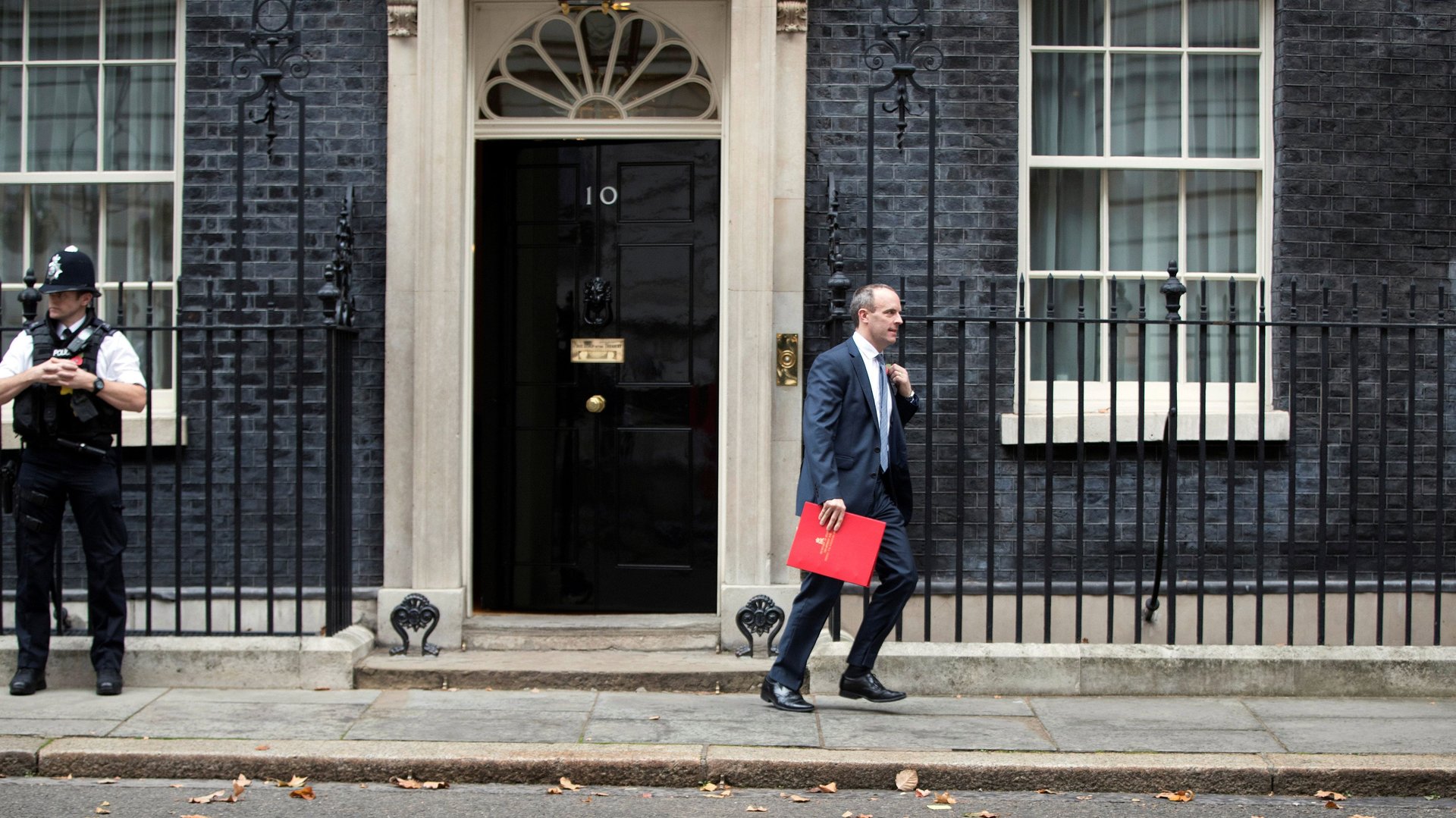Brexiteers love Brexit until they have to achieve it. Then they resign
UK prime minister Theresa May was always going to have a tough time selling the draft deal laying out Britain’s exit from the EU. Still, the wave of resignations today immediately after May won her cabinet’s approval of the deal have got to sting.


UK prime minister Theresa May was always going to have a tough time selling the draft deal laying out Britain’s exit from the EU. Still, the wave of resignations today immediately after May won her cabinet’s approval of the deal have got to sting.
The most notable of the four ministers to quit so far is Brexit secretary Dominic Raab, who wrote in his resignation letter this morning (Nov. 15) that he could not “in good conscience support the terms proposed for our deal with the EU.” (It’s worth noting that Raab himself drafted the deal. This is what the kids might call a real self-own.) Meanwhile, work and pensions secretary Esther McVey said that if she were to vote for the deal, “I could not look my constituents in the eye.”
To those outside the UK, such resignations may seem puzzling. In the US, for example, politicians typically quit their jobs because they have no other choice in the midst of controversy or scandal, not because they disagree with their colleagues. But in the last year, it’s become increasingly common for British politicians to claim that they are quitting to clear their conscience.
Prior to Brexit, leaving UK politics out of principle—”quitting solely to publicize a strongly held point of dispute with the government, eschewing all future preferment and ending one’s frontline career,” was quite rare, writes Theo Barclay in his book Fighters And Quitters: Great Political Resignations. In the three centuries that a cabinet government has existed in the UK, fewer than 100 cabinet ministers have resigned, and many in response to scandal or political infighting, according to Barclay.
There were a few notable exceptions: Foreign secretary Robin Cook resigned in 2003 in protest over the Iraq War. Deputy prime minister Geoffrey Howe delivered a famously excoriating speech in 1990 over Margaret Thatcher’s policies, which was widely believed to have led to Thatcher’s resignation three weeks later. And in another well-known example, Katharine Marjory Stewart-Murray stepped down in 1938 over the UK government’s initial desire to appease Adolf Hitler.
By contrast, Raab’s exit brings to 18 the number of cabinet ministers who have quit since last November—more than half for reasons related to Brexit. And more are expected. The principled resignation has introduced to UK politics a level of upheaval (paywall) not seen in decades.
Politicians on both sides tend to cast their departures as noble choices. But many may also be motivated by their unwillingness to be tainted by the consequences of Britain’s looming departure from the EU.
“Since the vote, the various trade-offs and compromises and not particularly attractive aspects of Brexit have begun to emerge,” says Jonathan Portes, a professor of economics and public policy at King’s College London. “We now have a position where, although there was a majority for Brexit, there isn’t a majority for any particular form of Brexit. Until we have some consensus…it’s very difficult to see how we can get ourselves out of this particular political situation.”
The 2016 referendum was a simple “yes” or “no” vote—one in which many pro-Brexit politicians provided voters with more misinformation than truth. But actually governing in the resulting chaos is a thankless task. Quitting out of principle is a way to take a stand—and win political points with voters—without having to deal with the blowback over a deal that is bound to leave at least some people unhappy.
Resigning in this way doesn’t end one’s political career. Instead, it can help set a person up for future political success. As Kitty Donaldson and Tim Ross write in Bloomberg: “By quitting over May’s compromise position with the European Union on the U.K.’s departure, Raab has lined himself up to stand in a future leadership contest as a Brexit purist —a position popular with a large tranche of Conservative lawmakers and members.”
May has given the government three choices: “My deal, no deal, or no Brexit.” The resignations now make the possibility of a no-deal scenario more likely, which would be catastrophic for the government—and, more importantly, the UK economy.
Politicians can try to save their own skins while citing their conscience. But as John Cassidy wrote for The New Yorker when a Brexit-related brouhaha triggered a previous wave of exits: “However many resignations there are, the realities of Brexit will remain.”